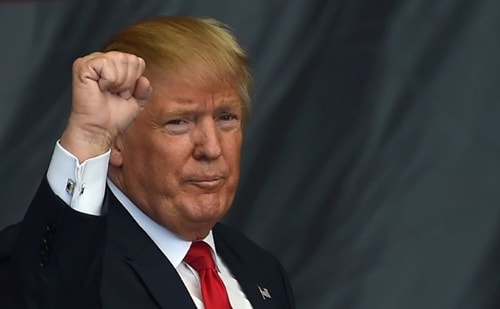Controversy over Trump's mental health test
The question of whether the president should be required to undergo a mandatory mental health examination is causing a stir in the US.
|
US President Donald Trump. Photo:AFP. |
The recently published book "Fire and Fury: Inside the Trump White House" by Michael Wolff has raised many doubts about the mental health of President Donald Trump. But besides that, another question also appeared: Why is the US president, the most powerful person in the world, not required to undergo a rigorous mental health test, according toCNN.
Trump defended himself on Twitter by claiming he was a "stable genius." However, the White House boss's statement still failed to dispel the question of why a person holding the nation's nuclear codes was not required to undergo a thorough mental capacity assessment.
Argumentative
“I think it’s perfectly legitimate for us to ask,” said Julian Zelizer, a professor of history and public affairs at Princeton University. “This isn’t about scandal or exposing anybody. It’s about finding out whether someone is fit to lead the country and whether there are problems with the president or the country or his advisers that they should know about.”
Trump, 71, will undergo a physical examination on January 12 at Walter Reed National Military Medical Center. White House press secretary Sarah Huckabee Sanders promised to provide the results as soon as possible, but it is up to the president to decide what information to release.
CNNcontacted a series of former White House physicians to learn about the procedures typically performed during medical examinations for US presidents and whether they had to undergo any mental capacity tests, but all of them refused to answer or were unavailable.
The debate over the mental capacity of the US president is not new. Former President Jimmy Carter sought to change the criteria in the mid-1990s, arguing that the head of the White House should be evaluated by an outside panel of medical experts to avoid emotional bias.
"Currently, the judgments are made by the president's personal physicians, who must always try to balance the trust that their patients place in them with the good of the nation. We must find a better way," Mr. Carter wrote in December 1994 in the Journal of the American Medical Association.
Carter pushed for the creation of a nonpartisan panel of medical experts, unrelated to the president's care, to be charged with "determining the president's fitness" so that "the president's personal physicians would not have conflicts of interest."
According to Zelizer, there should be no debate about the president's mental health examination because it is mandatory for the country.
"The biggest concern is the president's ability to mobilize forces, whether to use nuclear power or whether to send troops into a conflict zone. Both are bad. That's where we need to make sure the president's mind is working properly. So I think that's the number one issue," Zelizer said. "More than anything, it's important for democracy: We have to know whether the person sitting in that chair is physically and mentally fit."
Gail Saltz, professor of psychiatry at New York Presbyterian Hospital, says internists should certainly ask questions about memory and mental status in an older adult.
“If you’re a good internist, you have to ask about these issues because they need to be identified and treated,” Saltz said. “I would be surprised if the White House said there wouldn’t be a psychiatric and neurological evaluation process” when examining the president.
The White House said on January 8 that the tests on January 12 will not include a mental capacity assessment.
Meanwhile, Nassir Ghaemi, a professor of psychiatry at Tufts Medical Center in Boston, has explored the link between leadership and mental illness in a book he wrote.
Ghaemi warns against removing a leader due to mental health issues because some of the greatest leaders in history, such as the late British Prime Minister Winston Churchill and US President Abraham Lincoln, suffered from depression and benefited from it.
"People with mild manic symptoms are more creative and resilient than mentally healthy people," Ghaemi told the channel.CNNJanuary 6th
|
Michael Wolff, author of the controversial book about US President Donald Trump. Photo:AFP. |
Author Michael Wolff has written that advisers close to President Trump were worried about his mental health and that discussions about replacing him "were daily happenings in the White House." However, the information has not been verified.
In an attempt to quell skepticism, the Trump administration responded strongly over the weekend, criticizing Wolff and his book, while also attempting to defend the White House boss.
"In fact, throughout my life, the two greatest assets I have had are my mental stability and that I am really smart," President Trump tweeted on January 6.
US Secretary of State Rex Tillerson affirmed that he "never doubted" President Trump's mental health and he "had no reason to doubt it".
CIA Director Mike Pompeo reiterated the message on January 7, describing the book's comments about President Trump's mental health as "absolutely absurd." "The president still reads the documents we provide. He watches the daily intelligence briefings very carefully," Pompeo asserted.
But California Democratic Rep. Adam Schiff offered a different assessment. "Clearly, we have a severely impaired person sitting in the Oval Office," Schiff said on NBC's "State of the Union."CNNJanuary 7th
All the controversies surrounding President Trump's mental health will likely only be over once the results of his January 12 physical exam are released. But according to writers Wayne Drash and Ben Tinker fromCNN, it doesn't really matter much since ultimately it's up to Mr. Trump to decide what to share.




